必修一 unit 3语法
高中英语 牛津译林版必修一-Unit3 重点小结(词汇短语句式语法)

Unit3 Getting along with others重点小结【重点词汇】1.sight n.视力;视觉;视野out of sight看不见;在视线外in/within sight看得见;在视线内catch sight of看见at first sight乍看起来;一看见at the sight of一看见……lose sight of看不见lose one’s sight失明come into sight进入视野中2.make it能够出席;准时到达;获得成功3.recover vi.恢复健康;恢复常态vt.全额收回;寻回;重新获得;恢复,重新控制recover from...从……中恢复recover oneself某人恢复知觉recover sth重新获得/找回某物recovery n.恢复;复苏;痊愈make a recovery from...从……中恢复4.respond vi. & vt.回答,回应;作出反应,响应respond to sth对……作出反应/回答response n.回答,响应,反应in response to...作为对……的反应make a quick response to...对……作出很快的反应responsible adj.有责任的;可依靠的;负责的be responsible for sth/sb对……负责5.loss n.失去,丧失;亏损;去世;损失at a loss不知所措,困惑lose v.丢失;损失,丧失lose face丢脸lose weight减肥lost adj.丢失的,丧失的;迷失的be lost in陷入……6.judge vi.&vt.评价,(尤指)批评;判断,认为n.法官;裁判员judge...from...根据……判断……judging from/by...根据……判断judgment n.判断,判决书make a judgment 作判断7.apologize vi.道歉,谢罪apology n.道歉;认错apologize (to sb) for (doing)sth因(做)某事(向某人)道歉apologize for oneself为自己辩解或辩护accept sb’s apology 接受某人的道歉owe sb an apology应向某人道歉make an apology to sb for sth因某事向某人道歉8.behaviour n.行为,举止,态度behave v.表现;有礼貌behave well/badly to/towards sb对某人表现好/差behave oneself守规矩,表现得体9.case n.具体情况,事例;案件;容器in case 万一,以防万一in case of...假使……/万一……in any case无论如何,总之in this/that case如果这样/那样的话,在这种/那种情况下in no case 决不in the case of...就……来说as is often the case这是常有的事as the case may/might be看情况,视情况而定10.ignore vt.忽视,对……不予理会ignorance n.无知;愚昧out of ignorance 出于无知ignorant adj.无知的;愚昧的be ignorant of 不了解;不知情11.suffer vi.受苦,受折磨;变差vt.遭受,蒙受suffer from遭受;患病suffer pain/defeat/hardship/damage遭受痛苦/失败/艰难/破坏suffering n.痛苦;苦恼;让人痛苦的事sufferer n.患难者;患病者12.count on依赖,依靠,指望count on/upon=depend/rely on/upon依赖,依靠count on sb to do sth依靠/指望某人做某事count...in把……包括在内count...out不包括count sb/sth as/to be...把某人/物看作……count up=add up把……加起来countable adj.可数的13.in person亲自,亲身in order按顺序in pain痛苦,在苦恼中in trouble处于困境中in silence在寂静中in surprise惊奇地14.have trouble (in) doing sth做某事有困难/麻烦in trouble在危险、受罚、忧虑的处境中out of trouble摆脱麻烦;脱离困境get into trouble陷入困境;遇到麻烦get sb into/out of trouble使某人陷入/摆脱困境take the trouble to do sth不辞辛劳做某事;费神做某事have trouble with sth做某事有困难/麻烦15.respect vt.尊重,尊敬n.尊敬,敬意;重视respect sb for sth因某事而尊重某人have/show respect for sb尊重某人out of respect for...出于对……的尊敬;顾及16.bring out使显现,使表现出bring about带来;引来;造成bring along使发展;促使成长bring down打落;击落;降低bring forth生产;产出bring forward提出;把……提前bring in带来;引来;引进bring up 抚养;教育;提出;呕吐17.measure vt.估量,判定;测量;有……长/宽/高n.措施;衡量measure...by...用……来衡量……make...to one’s measure按某人的尺寸做(衣服等)take measures to do sth采取措施做某事in some measure 在某种程度上economy measures 节约措施economic measures 经济措施measurement n.测量18.reflection n.沉思;反射;映像;反映be lost in reflection陷入深思之中reflect vt.映射;反射vi.思考reflect...in...在……中反映出/映照出……reflect on思考,反省19.seek (sought, sought)vi.试图;寻找;争取vt.寻求;寻找seek one’s fortune/fame追求财富/名誉;碰运气seek after/for寻找;追求seek sth from sb向某人寻求某物seek to do sth(=try/attempt to do sth)试图/企图做某事20.escape vi.&vt.逃跑,逃脱;避开,避免;被遗忘n.逃离,逃脱escape from 从……逃脱/逃避escape from reality逃避现实escape into逃入escape (doing) sth避免(做)某事escape punishment=escape being punished 逃避处罚make one’s escape逃走a fire escape消防通道a narrow escape 死里逃生21.be meant to do sth注定要做某事,应做某事sth is meant for sth/sb某物是为……准备/设计的mean to do sth打算做某事mean doing sth意味着做某事meant to have done = had meant to do本来打算做(实际上没做)22.benefit n.好外;益处vt.使受益vi.得益于sth benefit(s) sb某事对某人有益sb benefit(s) from sth某人从某事中受益be of benefit to...对……有益for one’s benefit为了帮助某人;为了某人的利益to one’s benefit对某人有益beneficial adj.有益的;受益的be beneficial to...(=be of benefit to...) 对……有益23.take on呈现,具有;承担;接受;从事;较量;开始雇用take away 拿走;带走;夺走take back 退回;拿回;归还take down记下;拆卸take in 吸收;理解;欺骗take off 脱下;起飞;休假;(事业)腾飞take out 取出;拔掉;带出去take over接管;接任24.moment n.时光,时机;瞬间;某个时刻at the moment 此刻,目前,那时(常用于一般现在时、一般过去时和进行时) at that moment 就在那时,当时for a moment一会儿,片刻(表示片刻的延缓,常与延续性动词连用)for the moment目前,暂时in a moment(=in a minute;very soon)立即,马上(多与将来时连用)the moment+从句=as soon as/the minute/the instant/the second/directly/immediately+从句=hardly/scarcely...when...=no sooner...than...一……就……fort vt.宽慰,抚慰n.舒服;安慰comfort sb 安慰某人in comfort舒服地take comfort from...从……中得到慰藉comfortable adj.舒适的,(人)安逸的uncomfortable adj.不舒服的,不安逸的discomfort n.不舒服;不安comfortably adv.安逸地26.recognize vt.承认,意识到;认出,辨别出recognize sb/one’s voice认出某人/听出某人的声音be recognized to be/as...被认为是……It is recognized that...人们公认……recognition n.认出;认识beyond (all) recognition(完全)认不出来27.admire vt.钦佩;欣赏admire sb for(doing) sth因为(做)某事而钦佩某人admirer n.崇拜者admiration n.佩服admiring adj.羡慕的;钦佩的admirable adj.令人钦佩的;值得赞美的【重点句式】1.Whether we’re walking to school,doing homework or just hanging out at theweekend,we’re hardly out of each other’s sight.无论我们是步行去学校,做作业还是只是在周末闲逛,我们几乎不离开彼此的视线。
高中英语必修一Unit-3-Travel-journal知识点

stop doing 停止做某事16. as usual 像平常一样17. so…that 如此… 以至于…So + adj + a/an + n. + thatSuch + a/an +adj. + n. + that18. be familiar with 对…熟识(人作主语)be familiar to 为…所熟识(物作主语)二、学问要点1. Which kind of transport do you prefer to use: bus or train?prefer v.更宠爱;选择某事物(而不选择其他事物)(1)prefer sth.更宠爱……prefer (sb.) to do sth.更宠爱(某人)做……prefer that更宠爱[that从句中常用(should)+动词原形]prefer sth./doing...to sth./doing...与……相比更宠爱……;宁愿……,不愿……e.g. I would prefer meat to fish.我宠爱肉赛过(宠爱)鱼。
I prefer singing to acting. 我宠爱唱歌赛过演戏。
prefer to do...rather than do...宁可……也不……e.g. He prefers to stay at home rather than go shopping.他宁可呆在家里也不情愿去逛商店。
(2)preference n. 偏爱;爱好;宠爱give preference to sb./sth.给……以实惠;优待2. Then she persuade me to buy one.然后她动员我也买了一辆.persuade vt.劝服; 劝服; vi.被劝服persuade sb. (not) to do sth.persuade sb. into / out of doing sth.e.g. I persuaded him to do it. = persuade him into doing it.我已劝服他做这件事。
Unit 3-4 语法汇总讲义-高中英语新人教版(2019)必修第一册

高中英语必修一语法汇总Unit 3:附加疑问句一、附加疑问句的定义附加疑问句,又称反义疑问句,主要用于口语,其作用是说话人向对方验证自己的陈述或者判断,也可以用于祈使句表示请求或者建议。
二、附加疑问句的构成附加疑问句包括陈述部分和附加疑问部分。
附加疑问部分一般由助动词、be 动词或情态动词和表示主语的代词构成。
组成例句肯定式陈述部分+否定附加疑问部分You often play badminton, don't you?You're going to the gym with me, aren't you?否定式陈述部分+肯定附加疑问部分It's not a real sport, is it?They can't finish it by Friday, can they?含有否定词的陈述部分+肯定附加疑问部分Nobody saw him walk into the room, did they?You've never been to Paris, have you?祈使句+附加疑问部分Come along with me, will you?/can you?/won't you?/can't you?Don't make any noise, will you?附加疑问句的答语与一般疑问句类似,注意其与汉语表达习惯的差异。
如:(1)A:The29th Olympic Games were held in Beijing,weren't they?B:Yes,they were.(Yes, that's right.)(2)A:MichaelJordan started to play basketball in college, didn't he?B:No,he didn't. He first played in a team in senior high school.(3)A:Davidhas been to a boxing match, hasn't he?B:No,he hasn't. He always watches boxing on TV.(4)A:Youcan't cook, can you?你不会做饭,是吗?B:Yes,I can. I'm good at cooking.不,我会。
人教版高一英语必修一Unit-3-语法

(2) 用在状语从句中用一般现在时代替将来时。 If you do that again, I’ll hit you.
(3) 用在I bet 和I hope后面, 常用一般现在时 表将来。 I bet you don’t get up before ten tomorrow. 我敢说你明天不到10点是不会起床的。
③ be to+动词原形:表示按计划要发生的事 或征求对方意见。 Are we to go on with this work?
④ be about to+动词原形,表示即将发生 的动作,不与表示将来的时间状语连用。
I was about to go swimming when my guide shouted at me and told me not to do so. 我正要去游泳, 这时向导大声叫我不要 去。
练一练
1. Betty i_s__le_a_v_i_n_g(leave) for Guangzhou by plane at 3:00 this afternoon. Her brother Bob i_s__s_e_e_in__g(see) her off. It’s half past one now. They _a_re__w__a_it_i_n_g(wait) for a taxi outside the school gate.
⑤ 一般现在时表示将来时 (1) 按规定预计要发生的未来动作,仅限于
动词come, go, leave, move, start, return, arrive, begin, stay等动词. The plane takes off at 10:10. That is, it’s leaving in ten minutes.
高一必修一unit3语法
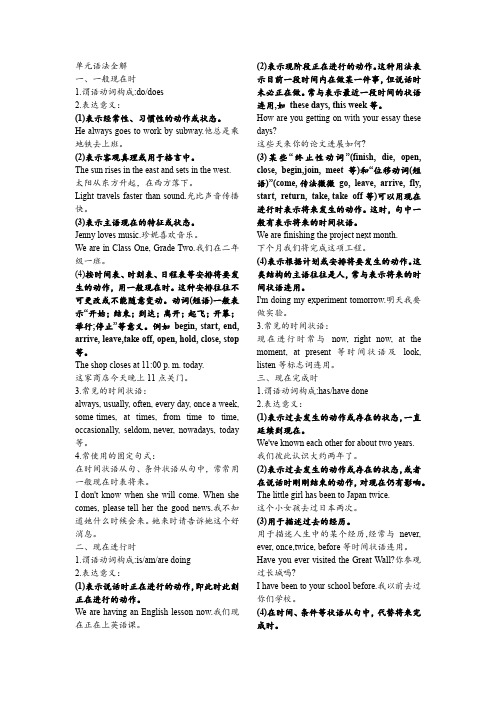
单元语法全解一、一般现在时1.谓语动词构成:do/does2.表达意义:(1)表示经常性、习惯性的动作或状态。
He always goes to work by subway.他总是乘地铁去上班。
(2)表示客观真理或用于格言中。
The sun rises in the east and sets in the west.太阳从东方升起,在西方落下。
Light travels faster than sound.光比声音传播快。
(3)表示主语现在的特征或状态。
Jenny loves music.珍妮喜欢音乐。
We are in Class One, Grade Two.我们在二年级一班。
(4)按时间表、时刻表、日程表等安排将要发生的动作,用一般现在时。
这种安排往往不可更改或不能随意变动。
动词(短语)一般表示“开始;结束;到达;离开;起飞;开幕;举行;停止”等意义。
例如begin, start, end, arrive, leave,take off, open, hold, close, stop 等。
The shop closes at 11:00 p. m. today.这家商店今天晚上11点关门。
3.常见的时间状语:always, usually, often, every day, once a week, some-times, at times, from time to time, occasionally, seldom,never, nowadays, today 等。
4.常使用的固定句式:在时间状语从句、条件状语从句中,常常用一般现在时表将来。
I don't know when she will come. When she comes, please tell her the good news.我不知道她什么时候会来。
她来时请告诉她这个好消息。
二、现在进行时1.谓语动词构成:is/am/are doing2.表达意义:(1)表示说话时正在进行的动作,即此时此刻正在进行的动作。
2019外研版高中英语必修一Unit3 Family matters 语法 一般现在时

Unit3 Family matters 语法一般现在时一、一般现在时观察①I often read books in my spare time.在我的空闲时间我经常读书。
②Mary is good at music.玛丽擅长音乐。
③The earth moves around the sun.地球绕着太阳转。
④You'll make great progress if you work hard!如果你努力学习/工作,你会取得很大进步!⑤The train leaves at 7: 25 this evening.火车今晚7: 25离开。
⑥Harry Potter is set in the modern world.《哈利·波特》以现代世界为背景。
⑦Pride goes before a fall.骄者必败。
归纳1.构成:动词①________或动词的②________形式。
2.基本用法:(1)一般现在时表示现在经常发生的动作或存在的状态,常和often、always、usually、sometimes、every day、seldom,never等表示的时间状语连用,如句①。
(2)一般现在时用于描述主语的特征、性格、④________等,如句②。
(3)一般现在时用于陈述客观事实或⑤________,如句③。
(4)在主从复合句中,当描述将来的事情时,条件状语从句和时间状语从句用一般现在时代替⑥________,如句④。
(5)一般现在时表示按规定、计划或时间表将要发生的动作,通常限于表示“⑦________”的非延续性动词(词组),如go、come、leave、arrive、take off等,其后常跟有表示将来的时间状语,如句⑤。
(6)小说故事、电影、文学作品等的情节介绍、评论等一般使用般现在时,如句⑥。
(7)一般现在时常用于⑧________中,如句⑦。
二、现在进行时观察①All the classmates are reviewing the lesson in the classroom now.所有同学此刻正在教室里复习功课。
高中英语人教版必修一:Unit 3单元笔记
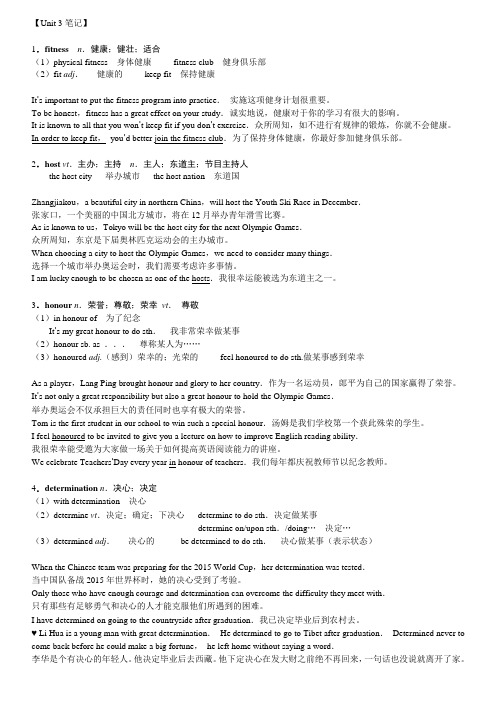
【Unit 3笔记】1.fitness n.健康;健壮;适合(1)physical fitness身体健康fitness club健身俱乐部(2)fit adj.健康的keep fit保持健康It's important to put the fitness program into practice.实施这项健身计划很重要。
To be honest,fitness has a great effect on your study.诚实地说,健康对于你的学习有很大的影响。
It is known to all that you won't keep fit if you don't exercise.众所周知,如不进行有规律的锻炼,你就不会健康。
In order to keep fit,you'd better join the fitness club.为了保持身体健康,你最好参加健身俱乐部。
2.host vt.主办;主持n.主人;东道主;节目主持人the host city举办城市the host nation东道国Zhangjiakou,a beautiful city in northern China,will host the Youth Ski Race in December.张家口,一个美丽的中国北方城市,将在12月举办青年滑雪比赛。
As is known to us,Tokyo will be the host city for the next Olympic Games.众所周知,东京是下届奥林匹克运动会的主办城市。
When choosing a city to host the Olympic Games,we need to consider many things.选择一个城市举办奥运会时,我们需要考虑许多事情。
I am lucky enough to be chosen as one of the hosts.我很幸运能被选为东道主之一。
人教版高英必修一Unit3 重点短语句子复习汇总

必修一Unit3 重点短语词组句子翻译一.短语词组:1.作一次自行车旅行take a bike trip2.优缺点the advantages and disadvantages3.自从…;从那以后ever since4.成长;长大grow up5.喜爱be fond of6.对…兴奋be excited about7.宁可做某事;更喜欢做某事prefer to do sth / prefer doing A todoing B8.在某人日常生活中in one’s daily life9.流经;流过flow through10.梦想或渴望做某事dream about doing sth11.说服某人做某事persuade sb. to do sth / persuade sb intodoing sth12.使某人对某事感兴趣get sb interested in sth13.大学毕业后after graduating from14.得到/有机会做某事have/ get the /a chance to do sth15.想到做某事have the idea to do sth16.关心;在乎care about17.从源头到终点from where it begins to where it ends18.做某事最好的办法the best way to doing sth.19.给某人一个坚毅的目光give sb a determined look20.改变主意change one’s mind21.在海拔…的高度at an altitude of22.下定决心;作出决定make up one’s mind23.屈服;让步give in24.穿着be dressed in25.似乎做某事seem to do sth.26.在落日下in the setting sun27.下午晚些时候in the late afternoon28.像往常一样as usual29.环顾四周look around/round30.宿营make camp31.支起帐篷put up a tent32.半夜at midnight33.陪伴for company / keep sb company34.祝你旅途好运/愉快good luck on your journey35.迫不及待要做某事can hardly wait to do sth/ can’t wait todo sth36.对…的态度attitude to二.课文重点长难句:1.She gave me a determined look—the kind that said she would notchange her mind.她给了我一个坚定的眼神,是一种她绝不会改变主意的眼神。
新版人教必修一Unit3 Sports and fitness核心考点归纳
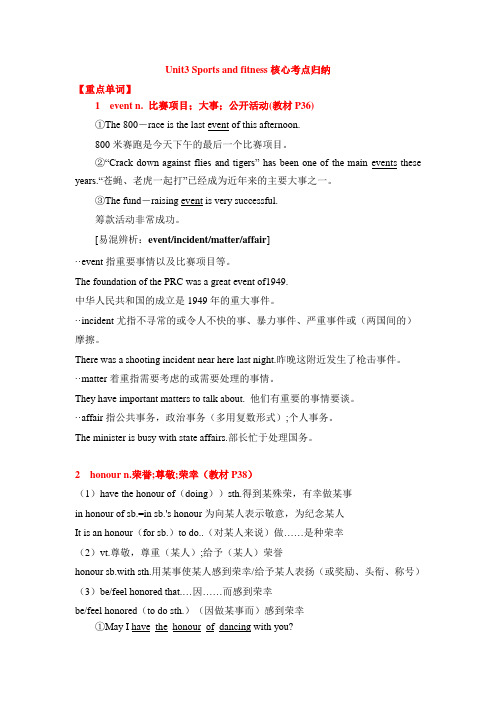
Unit3 Sports and fitness核心考点归纳【重点单词】1 event n. 比赛项目;大事;公开活动(教材P36)①The 800-race is the last event of this afternoon.800米赛跑是今天下午的最后一个比赛项目。
②“Crack down against flies and tigers” has been one of the main events these years.“苍蝇、老虎一起打”已经成为近年来的主要大事之一。
③The fund-raising event is very successful.筹款活动非常成功。
[易混辨析:event/incident/matter/affair]··event指重要事情以及比赛项目等。
The foundation of the PRC was a great event of1949.中华人民共和国的成立是1949年的重大事件。
··incident尤指不寻常的或令人不快的事、暴力事件、严重事件或(两国间的)摩擦。
There was a shooting incident near here last night.昨晚这附近发生了枪击事件。
··matter着重指需要考虑的或需要处理的事情。
They have important matters to talk about. 他们有重要的事情要谈。
··affair指公共事务,政治事务(多用复数形式);个人事务。
The minister is busy with state affairs.部长忙于处理国务。
2 honour n.荣誉;尊敬;荣幸(教材P38)(1)have the honour of(doing))sth.得到某殊荣,有幸做某事in honour of sb.=in sb.'s honour为向某人表示敬意,为纪念某人It is an honour(for sb.)to do..(对某人来说)做……是种荣幸(2)vt.尊敬,尊重(某人);给予(某人)荣誉honour sb.with sth.用某事使某人感到荣幸/给予某人表扬(或奖励、头衔、称号)(3)be/feel honored that.…因……而感到荣幸be/feel honored(to do sth.)(因做某事而)感到荣幸①May I have_the_honour_of_dancing with you?能赏光和我跳舞吗?②The stadium was named in_honour_of the club's first chairman.该体育馆以俱乐部的第一任主席命名以示纪念。
选择性必修一 unit3 单元知识要点归纳

选择性必修一unit3 知识要点归纳一、短语、词块1.wake up to 意识到;认识到2.On/at the edge of 在..的边缘3.Spread out伸展;延长ed to do sth. 过去常常做某事5.Apart from 除...之外6.Be allowed to do sth. 被允许做某事7.Ban sb. From doing sth. 禁止某人做某事8.Feed on以...为食9.On the move 在行进中;在移动中10.Accompany sb. to sp. 陪伴某人去某地11.Live a modern life 过着一种现代生活12.A small number of 少量的13.Pack one’s bag 收拾某人的包14.Set out 出发;启程(set out to do sth. 着手做某事)15.carry sth.with sb. 某人随身携带某物16.Anything like与...相像17.Be blessed with 在...方面有福气18.Be covered by vast sheets of ice 被巨大的冰层覆盖19.At the far side of the valley 在山谷的另一边20.Close by 附近21.Leave behind 留下;遗忘;落下22.A place with no roads or towns 一个既没有道路又没有城镇的地方23.A way of life 一种生活方式24.At peace with 与...和平共处25.Catch one’s eye 吸引...的目光26.Pick up 拿起,拾起;(开车)接载;接收(信号);(不费力)获得、学会;恢复(体力、健康)27.In place在适当的位置28.All the way 一路上29.Result in 导致;引起30.As well as 和,以及31.Fit into 适合;与...融为一体32.In a traditional way 以一种传统的方式33.Be home to 为...所在地/栖息地34.Theme park 主题公园35.And so on 等等36.Be famous for 因......而出名37.Appeal to 有吸引力;呼吁;请求;上诉38.Be familiar with 熟悉......e true 实现40.More than 不仅仅41.Put on上演;穿上;戴上;假装42.Situated/located in... 位于43.In the old-fashioned way 以老式的方法(in fashion 时尚的;时髦的)44.Have fun doing..... 做.......玩得开心45.Up to 达到;直到;能胜任46.Upside down 颠倒;倒转;翻转47.On display/show/exhibition 在展览中48.In addition to 除.......之外(还)49.In length/size/width 在长度/尺寸/宽度上50.Wander about/around 闲逛二、重点句式1.Even though the sun is brightly shining,telling whether it is morning or night is impossible. 虽然阳光灿烂,但判断是早上还是晚上是不可能的。
Unit 3 第3课时 Grammar语法 反意疑问句高一英语必修一(人教版2019)
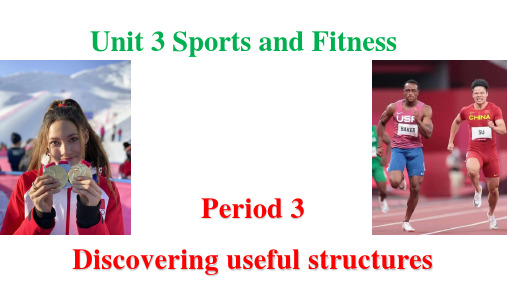
3.陈述句的主语是nobody, no one, everyone, somebody等不定代词时,反意疑问部分的主语多用 he/they。 例:Everyone knows him, don’t they/ doesn’t he? 陈述句的主语something,nothing,anything,everything 等不定代词时,反意疑问部分的主语多用it。 例:Nothing in the world is difficult, is it?
?
4. Everyone should be on time, shouldn’t they ?
5. What he said isn’t true,
is it ?
6. She dislikes sports, doesn’t she ?
7. There was a mountain, wasn’t there ?
— They don’t work hard, do they? — Yes, they do./ No, they don’t.
不,他们工作努力。/ 是的,他们工作不 努力。
2.当陈述句部分是否定结构,反意疑问句用肯定式提问时 ,回答yes或no与汉语的意思正好相反。这种回答时,yes 要翻译为“不”,no翻译为“是” 例:---Lucy didn't attend the meeting, did she? 露西没有参加会议,是吗?
Unit 3 Sports and Fitness
Period 3 Discovering useful structures
All sports for all people. —Pierre de Coubertin
新人教版必修一Unit3 重点语法:反义疑问句学习讲义+练习题

语法:反意疑问句一、基本用法与结构反意疑问句由“陈述句+简略疑问句”两部分组成,第一部分提出一种看法,第二部分用来质疑或表示证实。
陈述部分与疑问部分的动词时态和动词性质应保持一致,而且肯定和否定形式彼此相反,即陈述部分为肯定式时,疑问部分用否定式,陈述部分为否定式时,疑问部分用肯定式:He likes English, doesn’t he? 他喜欢英语,是吗?He doesn’t like English, does he? 他不喜欢英语,是吗?【注】1. 若陈述部分含有seldom, hardly, never, few, nothing等否定词或半否定词,其疑问部分要用肯式:He has few friends here, has he? 他在这儿几乎没什么朋友,是吗?She said nothing, did she? 她什么也没说,是不是?2. 若陈述部分含有带否定前缀的词,疑问部分仍用否定式:It is unfair, isn’t it? 这不公平,不是吗?It is impossible, isn’t it? 那是不可能的,是吗?二、反意疑问句的主语问题1. 基本原则:疑问部分的主语应与陈述部分主语一致,且只能是代词:Mary is a nurse, isn’t she? 玛丽是护士,对吗?2. 当陈述部分为there be句型时,疑问部分仍用there作“主语”:There was nothing in the room, was there? 房间里什么也没有,是吗?3. 当陈述部分的主语是指示代词时,疑问部分用it, they等代词:That is a new car, isn’t it? 这是一辆新汽车,是吗?4. 当陈述部分的主语是复合不定代词时,若陈述部分的主语为somebody, someone, everyone, everybody, no one, nobody等复合不定代词,其反意疑问句的主语在正式文体中用he,在口语或非正式文体中通常用they:Nobody was late, were they? 没有一个人迟到,是吗?5.当陈述部分的主语是something, anything, nothing, everything等复合不定代词时,其反意疑问句的主语要用it:Everything is ready, isn’t it? 一切都准备好了吗?Nothing is important, is it? 没有什么重要的,不是吗?三、陈述部分有动词have的反意疑问句1. 当have 为助动词时,其反意疑问句沿用同样的助动词:He has already left, hasn’t he? 他已经离开了,是吗?2. 当have 为实意动词时,要分两种情况:① 若表示“所有”,反意疑问句可以用have,也可以用do:He has a lot of friends here, hasn’t [doesn’t] he? 他在这儿有许多朋友,是吗?但是若陈述部分用的是have的否定式,反意疑问句用have 还是用do,取决于陈述部分的动词形式:He hasn’t any money, has he? 他没有钱,是吗?He doesn’t have any money, does he? 他没有钱,是吗?① 若表示“吃”、“玩”等意思,反意疑问句要用do:He has supper at 5, doesn’t he? 他5点吃晚餐,是吗?He had a good time at the party, didn’t he? 他在晚会上玩得很开心,是吗?3. 当用于have to时,通常也有两种可能:若表示经常性的行为,则多用加助动词do的形式;若表示特定的行为,则多用have:He often has to get up early, doesn’t he? 他经常要早起,是吗?He has to go to bed late tonight, hasn’t he? 他今晚要迟睡,是吗?四、含情态动词的反意疑问句1. 基本原则:在通常情况下,当陈述部分含有情态动词时,疑问部分会重复前面同样的情态动词:He can speak English, can’t he?他会说英语,是吗?We shouldn’t go, should we? 我们不应该去,对不对?2. 当陈述部分含有must时,要分两种情况:① 若must表示“必须”或“有必要”,疑问部分用mustn’t 或needn’t:You must leave at once, mustn’t [needn’t] you? 你必须(有必要)马上离开,是吗?但是若陈述部分有mustn’t表示禁止,疑问部分要must:You mustn’t laugh, must you? 你不准笑,知道吗?① 若must表示推测,疑问部分不能用must,而应根据must后的动词结构采用相应的动词形式:He must be tired, isn’t he? 他一定累了,是吗?五、陈述部分为祈使句的反意疑问句1. 基本原则:若陈述部分为祈使句,疑问部分通常用will you:Please help us, will you? 请帮帮我们,好吗?Come with us, will you? 同我们一起去,好吗?Don’t forget to post the letter, will you? 请别忘了寄信。
人教版英语必修一unit3

人教版英语必修一unit3
人教版英语必修一Unit3的主题是“Travel Journal”,主要学习如何写旅
行日志,掌握一些关于旅行的词汇和表达方式。
在这个单元中,学生将学习如何计划、准备和记录旅行,以及如何描述旅行中的所见所闻。
这个单元的语法重点是现在进行时表示将来的动作,词汇则包括一些与旅行相关的词汇,例如“trek”、“snack”、“schedule”等。
此外,这个单元还涉及到了一些跨文化的内容,例如不同国家的旅游景点和风俗习惯,以及如何用英语与外国游客交流。
通过这个单元的学习,学生可以提高自己的英语语言能力,同时也可以了解更多关于旅行的知识,为将来的旅行做好准备。
新外研社(19)高中英语必修一Unit3 Family matters单元知识总结
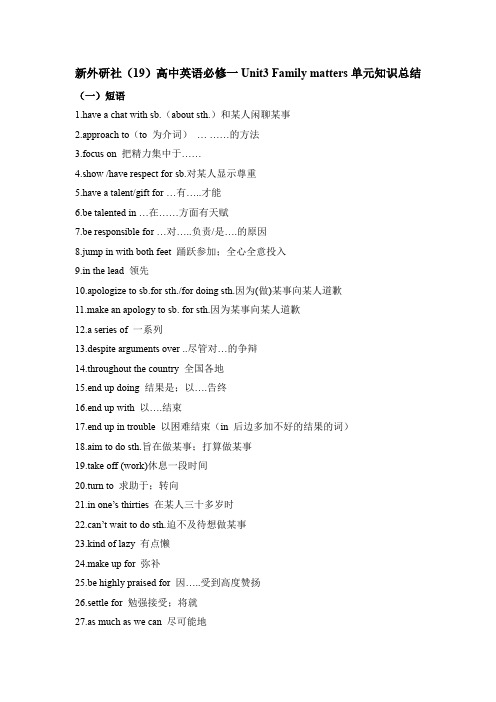
新外研社(19)高中英语必修一Unit3 Family matters单元知识总结(一)短语1.have a chat with sb.(about sth.)和某人闲聊某事2.approach to(to 为介词)… ……的方法3.focus on 把精力集中于……4.show /have respect for sb.对某人显示尊重5.have a talent/gift for …有…..才能6.be talented in …在……方面有天赋7.be responsible for …对…..负责/是….的原因8.jump in with both feet 踊跃参加;全心全意投入9.in the lead 领先10.apologize to sb.for sth./for doing sth.因为(做)某事向某人道歉11.make an apology to sb. for sth.因为某事向某人道歉12.a series of 一系列13.despite arguments over ..尽管对…的争辩14.throughout the country 全国各地15.end up doing 结果是;以….告终16.end up with 以….结束17.end up in trouble 以困难结束(in 后边多加不好的结果的词)18.aim to do sth.旨在做某事;打算做某事19.take off (work)休息一段时间20.turn to 求助于;转向21.in one’s thirties 在某人三十多岁时22.can’t wait to do sth.迫不及待想做某事23.kind of lazy 有点懒24.make up for 弥补25.be highly praised for 因…..受到高度赞扬26.settle for 勉强接受;将就27.as much as we can 尽可能地28. in second place 其次;第二29.a wide range of 大范围的;广泛的30.be proud of 以…..自豪(同义词组take pride in )31.to one’s surprise 令某人惊讶的是32.in surprise 惊讶地33.be related to 与…..有关34.now and then 时而;不时35.be positive about …对…..积极36.in detail 详细地(二)句型1.wish (that)+虚拟语气从句I wish she had come .I wish I were you .2.分词作状语1)Watched by millions , the ending to the race has divided opinions.2) Looking at it ,the lovely memory of that day came back to me at once .3.固定句式:be about to ..when…正要…..这时….I was about to throw everything away when my mother came in.3.虚拟语气:wouldn’t have done +if +..had done (对过去的事的假设)Mum wouldn’t have been happy if I’d left Jonny behind.(三)重点词汇&短语①The only way to come out on top is to adopt a different approach.脱颖而出的唯一途径就是采用一种不同的方法。
2019人教版高中英语必修一Unit 3 核心单词知识句型讲解

第11讲Unit 3 Sports and Fitness目标1掌握重点单词和词块的用法。
一、核心单词讲解清单一----词表词汇速记(限时25分钟)1. set an example 树立榜样set an example to/for sb 给某人树立榜样follow one's example 效仿某人;以某人为榜样take...for example 以……为例for example/instance 例如eg. We Chinese people are all called on to learn from Lei Feng, who we think sets an example to us all. 我们中国人都被号召向雷锋学习,我们认为他为我们树立了榜样。
2.honour(又作honor)n.荣誉;尊敬;荣幸● It's an honour for sb to do sth 对某人来说做某事很荣幸feel it an honour to do sth 为做某事感到荣幸in honour of...向……表示敬意;为纪念……● be/feel honoured to do sth 做某事感到荣幸● honourable adj.可敬的;体面的honoured adj.受尊敬的st but not least,I feel it a great honour to represent my class to take part in the group dancing competition.最后但同等重要的是,代表我们班参加团体舞比赛,我感到很荣幸。
3.determination n.决心;决定● with determination 有决心● determine vt.决定;确定;下决心;影响determine to do sth 决定做某事determine on/upon(doing)sth 决定(做)某事● determined adj.有决心的be determined to do sth 决心做某事(表示状态)【联想】“决定做某事”表达还有∶①decide to do sth ②make a decision to do sth③make up one's mind to do sth4.injure vt.使受伤;损害(hurt)● injured adj.受伤的;有伤的get injured 受伤the injured 伤员● injury n.伤害;损伤do an injury to sb 伤害某人5. lose heart 丧失信心;泄气lose one's heart to 某人倾心于……;爱上……put one's heart into 某人专心于……heart and soul全心全意;完全地learn...by heart 记忆;背诵eg. In no sense should you lose heart; keep trying and you will make it sooner or later. 决不应丧失信心;继续努力,你迟早会成功的。
高一英语必修一_Unit3_单元语法详解
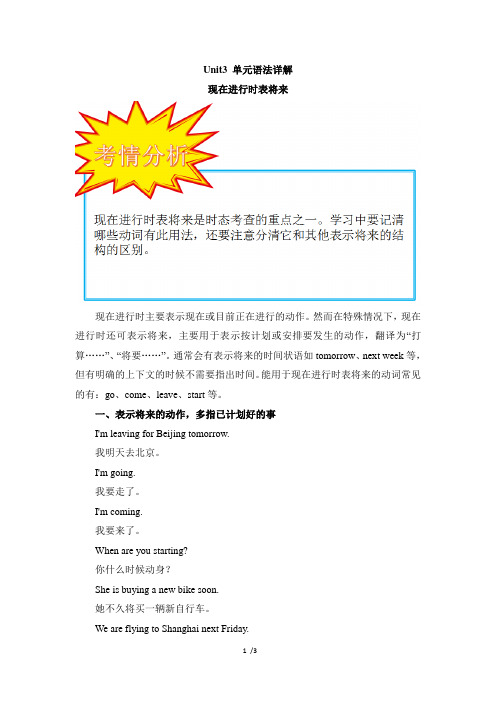
Unit3 单元语法详解现在进行时表将来现在进行时主要表示现在或目前正在进行的动作。
然而在特殊情况下,现在进行时还可表示将来,主要用于表示按计划或安排要发生的动作,翻译为“打算……”、“将要……”。
通常会有表示将来的时间状语如tomorrow、next week等,但有明确的上下文的时候不需要指出时间。
能用于现在进行时表将来的动词常见的有:go、come、leave、start等。
一、表示将来的动作,多指已计划好的事I'm leaving for Beijing tomorrow.我明天去北京。
I'm going.我要走了。
I'm coming.我要来了。
When are you starting?你什么时候动身?She is buying a new bike soon.她不久将买一辆新自行车。
We are flying to Shanghai next Friday.下周五我们乘飞机去上海。
例1 She (leave) tomorrow and you had better see her off.解析:本句考查时态,由时间状语tomorrow可知用现在进行时表将来。
答案:is leaving二、现在进行时也可在时间状语从句、条件状语从句中表示将来When you are passing by my front door,please drop in on me.当你从我家门前经过,请顺便来看看我。
注意:现在进行时的其他用法:1.表示现在或近期正在进行的情况。
I am writing a letter now.我现在正在写信。
Mr Green is writing another novel these days.格林先生这些天正在写另一部小说。
例2 Listen!The couple(quarrel)in the next room.解析:由语境及“Listen!”可知应用现在进行时。
人教版必修一 Unit3 知识点、词汇、语法填空、单句改错(word版有答案)

人教版必修一Unit4 EarthquakesUnit4 Earthquakes知识点详解Ⅰ. 常考单词必背1. burst vi. (burst,burst) 爆裂;爆发n. 突然破裂;爆发She burst into tears on hearing the sad news.一听到这一不幸消息,她突然哭了起来。
Upon his appearance,there was a burst of applause.他一出现就爆发了一阵掌声。
[快速闪记](1)burst in打断;闯入;突然出现burst into...突然开始;闯入……burst into laughter/tears =burst out laughing/crying突然大笑/哭起来(2)a burst of一阵……2. injure vt. 损害;伤害Most of the injured were women and children.大多数伤员都是妇女和儿童。
[快速闪记](1)injured adj.受伤的the injured伤员(2)injury n.伤;伤口;伤害3. shock vt.& vi.(使)震惊;震动n. 休克;打击;震惊I was shocked to hear that he had resigned.听到他辞职的消息我感到很震惊。
The news of my promotion came as a shock.我获晋升的消息着实让我一惊。
[快速闪记](1)be shocked by/at...对……感到震惊be shocked to do...因做……而震惊(2)a shock一件令人震惊的事(抽象名词具体化用法)(3)shocked adj.感到震惊的shocking adj.令人震惊的4. rescue n.& vt.援救;营救All the people nearby came to her rescue when hearing her cry for help.周围的人们听到她的呼救声都来营救她。
高一英语必修一unit3知识点

U1-u31.persuade: 说服,劝说(暗示是成功的,如果未成功则用try to persuade=advise sb to do sth)(1)persuade sb to do sth= persuade sb into doing sth意为“说服某人干某事”;Two years ago she bought an expensive mountain bike and then she persuaded me to buy one / into buying one.两年前,她买了一辆昂贵的山地自行车,然后还说服我买了一辆(山地车)。
(2)persuade sb not to do sth= persuade sb out of doing sth意为“说服某人不要干某事”;(否定)Two years ago she bought an expensive mountain bike and then she persuaded me not to buy one / out of buying one.2.Prefer的用法:(1)prefer … to …;比起…更喜欢…(2)prefer to do sth;更喜欢做某事What do you prefer to do after work? 你下班后一般干什么?(3)prefer doing sth to doing;比起某事更喜欢做某事I prefer doing this to doing that. 我宁做这事,不愿做那事。
(4)prefer to do sth rather than do sth/ prefer to do sth instead of doing sth宁愿做……而不做……She preferred to go with us rather than stay behind. 她愿意和我们一起去,而不愿意留下。
- 1、下载文档前请自行甄别文档内容的完整性,平台不提供额外的编辑、内容补充、找答案等附加服务。
- 2、"仅部分预览"的文档,不可在线预览部分如存在完整性等问题,可反馈申请退款(可完整预览的文档不适用该条件!)。
- 3、如文档侵犯您的权益,请联系客服反馈,我们会尽快为您处理(人工客服工作时间:9:00-18:30)。
必修一unit 3语法SENTENCE EXPLANATIONS[原句]They are Dai and grew up in western Yunnan Province near the Lancang River, the Chinese part of the river that is called the Mekong River in other countries. (P18)[分析]①该句结构是:主语(They)+系动词(are)+表语(Dai)+并列连词(and)+谓语(grew up)+地点状语(in western Yunnan Province near the Lancang River, the Chinese part of the river that is called the Mekong River in other countries)。
②句中that is called the Mekong River in other countries是一个定语从句,用来修饰先行词river。
③ the Chinese part of the river是the Lancang River的同位语,起解释说明的作用。
GRAMMAR现在进行时表将来[观察] 仔细观察下列句子,注意总结其用法规律。
1. I’m playing in London next Thursday.2. What are they doing after school today?3. Jane and Betty are going on separate holidays in a few days’ time.4. They are setting up a company to develop tourism in this area.5. She is getting married this spring.6. This match is starting at 2:30 (tomorrow).[用法归纳]1. 现在进行时可表将来,常含有“意图”、“安排”或“打算”的含义,并且与表将来的时间状语连用。
在一定的上下文中,时间状语也可以不用。
2. 表示位置移动的动词,如:come, go, leave, arrive等常用现在进行时表示将要发生的动作。
[拓展] 此外,be going to do sth. 结构也可表示将来,表示即将发生的事或不久将要发生的事,常与表示将来的时间状语连用。
如:I am going to sell this old car, and buy a new one.They are going to get married next year.注意:There be 句型中的be going to 结构为:There is / are going to be ... (注意be不能改为have) ,常用来表示将有某事发生。
如:[正] There is going to be a football match next Saturday in our school.[误] There is going to have a football match next Saturday in our school.[比较] be going to do sth. 与be about to do sth. 和will do sth. 的区别:1. be about to do sth.侧重于表达最近的将来,意为“即将……,就要……” ( = be on the point of doing do sth. ... 或be going to do sth. 加上just),且be about to do sth. 后不接时间状语,be going to do sth.可以接时间状语。
如:[误] I am about to go next week.[正] I am about to go.2. will没有“计划,准备”的意思,且在有条件从句的主句中,一般不用be going to, 而多用will。
如:If any beast comes at you, I’ll stay with you and help you.[练习] 翻译下列句子。
1. 他们将在9点钟来。
2. 我正准备离开办公室的时候,电话响了。
3. 如果时间许可的话,我们下星期天去爬山。
4. 我周六要带孩子们去动物园。
GRAMMAR1. They are coming at 9 o’clock.2. I was about to leave the office when the telephone rang.3. If time permits, we’ll go climbing next Sunday.4. I’m taking / am going to take the chil-dren to the zoo on Saturday.当“be doing”不再表示“进行”时……温故知新我们在初中学过现在进行时表示一个现在(即说话人的说话时刻)正在进行的动作,其实它还有其他的用法。
下面我们来了解一下现在进行时到底有哪些用法,以及高考中是如何考查的。
例句呈现请看下面的句子,你能体会到现在进行时的不同用法吗?1)They are making some repairs so it is noisy.2)—I haven’t seen Mary recently. What’s she doing?—Oh, she is writing her new novel.3)You are always leaving the clothes on the floor.4)She is always thinking of others first.5)I am leaving the country in about one week.6)What are you doing next Sunday?小结归纳我们都很熟悉现在进行时最基本的用法:表示一个现在正在进行的动作,如:句1);也知道它可表示在包括“说话时刻”在内的一段时间当中正在进行的动作,如:句2);有的同学或许还知道现在进行时常用来描写一种状态,往往显得生动,具有感情色彩,如:句3)(表示抱怨)、句4)(表示表扬);但你知道现在进行时还有一种特殊用法吗?它除了表示“现在”外,还可以表示“将来”!它可以表示按计划或安排即将发生的动作,如:句5)、句6)。
常用于这种结构的动词有:start, leave, go, arrive, come, stay, return, play, do, have, buy, read, see, meet等。
聚焦高考下面让我们来看看高考中对现在进行时是怎样考查的吧!1. 表示正在进行的动作,经常不出现明显的时间状语,而是由上下文暗示。
如:—What’s that terrible noise?—The neighbours _______ for a party.(北京2004)A. have preparedB. are preparingC. prepareD. will prepare(注意:斜体部分为最佳选项。
下同)2. 表示现阶段正在进行的动作。
如:Selecting a mobile phone for personal use is no easy task because technology _______ so rapidly. (NMET 2001)A. is changingB. has changedC. will have changedD. will change3. 表示按计划或安排即将发生的动作。
如:Ladies and gentlemen, please fasten your seat belts. The plane _______. (福建2006)A. takes offB. is taking offC. has taken offD. took off即学即用从A、B、C、D四个选项中,选出可以填入空白处的最佳选项。
1. Because the shop _______, all the T-shirts are sold at half price. (浙江2004)A. has closed downB. closed downC. is closing downD. had closed down2. You _______ television. Why not do something more active?A. always watchedB. are always watchingC. have always watchedD. were always watching3. —Are you still busy?—Yes, I _______ my work, and it won’t take long. (浙江2005)A. just finishB. am just finishingC. have just finishedD. am just going to finish 4. Since I won the big prize, my telephone hasn’t stopped ringing. People _______ to ask how I am going to spend the money. (湖南2005)A. phoneB. will phoneC. were phoningD. are phoning5. —What are you going to do this afternoon?—I am going to the cinema with some friends. The film _______ quite early, so we _______ to the bookstore after that. (重庆2005)A. finished; are goingB. finished; goC. finishes; are goingD. finishes; go[温馨提示] 如果上面有些题的答案是现在进行时,那你能说出它的具体用法吗?Key:1-5 CBBDCTEXT & TEST考点点拨考例回顾1. ... then she persuaded me to buy one. (P18)[考点] persuade说服,劝说[考例] There is nothing more I can try ______ you to stay, so I wish you good luck.(上海2007)A. being persuadedB. persuadingC. to be persuadedD. to persuade(注意:斜体项为最佳选项。
